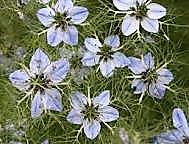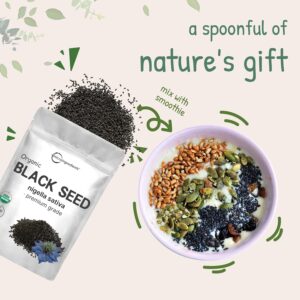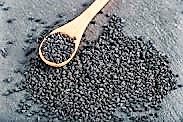Black Seed, Medicinal plant, Antioxidants, Anti-inflammatory, Antimicrobial, Antidiabetic, Immunomodulatory, Skin health, Black Cumin, Nigella sativa, Health Benefits, Medicinal Properties, Klounji
Exploring the Rich History From Ancient Remedies to Modern Discoveries.
1. The History of Black Seed
Black seed, also known as black cumin, nigella sativa, or kalonji, has a long and rich history of use for medicinal purposes. It is believed to have originated in the Middle East and has been used by traditional healers for centuries to treat a variety of health conditions.

The first recorded use of black seed was in ancient Egypt, where it was used to treat a variety of ailments, including respiratory problems, skin conditions, and digestive issues. Black seed was also used by the ancient Greeks and Romans and was mentioned in the writings of Hippocrates and Galen.
In the Middle Ages, this seed was used by Islamic scholars and physicians, including Ibn Sina (Avicenna). Ibn Sina wrote extensively about the medicinal properties of black seed and praised it for its ability to treat a wide range of conditions, including asthma, allergies, and high blood pressure.
Black seed continued to be used for medicinal purposes throughout the centuries, and its popularity spread to other parts of the world, including India, China, and Africa. In recent years, there has been a growing interest in the scientific research on black seed, and its potential health b Over the years, modern science has taken an interest in black seed, aiming to validate its traditional uses and explore its potential health benefits. Numerous studies have been conducted to uncover the bioactive compounds present in black seed, such as thymoquinone, which is believed to contribute to its therapeutic effects.
2. The Nutritional Profile: A Treasure Trove of Essential Compounds
When it comes to the nutritional profile of this seed, it truly is a treasure trove of essential compounds that contribute to its health benefits. Let’s delve into the key components found in black seed and understand why it has gained recognition as a nutritionally dense powerhouse.
- Essential Fatty Acids: This seed is rich in essential fatty acids, particularly omega-3 and omega-6 fatty acids. These fats play a crucial role in maintaining heart health, supporting brain function, and promoting overall well-being. The presence of these healthy fats in black seed makes it a valuable addition to a balanced diet.
- Plant Proteins: It contains a notable amount of plant-based proteins. Proteins are the building blocks of our body, essential for tissue repair, muscle development, and immune function. Including black seed in your diet can provide a plant-based protein source that complements a vegetarian or vegan lifestyle.
- Dietary Fiber: Good source of dietary fiber, which aids in digestive health and promotes regular bowel movements. Fibre helps to maintain a healthy weight, regulate blood sugar levels, and support a balanced gut microbiome. Incorporating black seeds into your diet can contribute to your daily fiber intake.
- Antioxidants: It is packed with antioxidants that help protect the body against oxidative stress and cellular damage caused by free radicals. The antioxidants found in black seeds, such as thymoquinone and nigellone, contribute to their potential anti-inflammatory and immune-boosting properties.
- Vitamins and Minerals: They contain a range of vitamins and minerals, including vitamin A, vitamin C, vitamin E, calcium, iron, and potassium. These essential nutrients play vital roles in various bodily functions, such as vision health, immune support, energy metabolism, and bone strength.
- Phytochemicals: This seed is abundant in phytochemicals, including flavonoids and phenolic compounds. These bioactive plant compounds have been associated with numerous health benefits, such as antioxidant, anti-inflammatory, and anticancer properties.
- Essential Oils: Renowned for its essential oils, which are concentrated compounds extracted from the seeds. These oils, particularly black seed oil, are rich in volatile compounds like thymoquinone, providing additional health-promoting effects.

Black Seeds Oil https://amzn.to/3vKCNLl
Understanding the nutritional profile of this seed reveals its immense potential as a functional food. Incorporating black seed into your diet can provide a diverse array of essential nutrients, antioxidants, and phytochemicals that contribute to overall health and well-being. Whether consumed as whole seeds, ground powder, or in the form of black seed oil, this nutrient-packed treasure holds the key to unlocking its myriad benefits.
3. Boosting Immunity Naturally, How Black Seed Supports a Healthy Defense System
Boosting our immunity naturally is a top priority for maintaining optimal health and well-being. One powerful ally in this quest is a black seed, which has been shown to support a healthy defense system. Let’s explore how these tiny seeds can play a role in enhancing our immune response and fortifying our bodies against external threats.
Black seed, also known as Nigella sativa or black cumin, has a long history of traditional use for its potential health benefits. In recent years, scientific research has shed light on its immune-boosting properties, validating its reputation as a natural immune-supporting agent.

One of the key ways the seed supports our immune system is through its bioactive compounds. It contains a compound called thymoquinone, which has been found to possess potent antioxidant and anti-inflammatory properties. These properties are crucial in maintaining a well-functioning immune system, as inflammation and oxidative stress can impair our body’s defense mechanisms.
Black seed has also been found to modulate our immune responses. It helps in regulating the activity of immune cells, such as natural killer cells, lymphocytes, and macrophages. These cells play vital roles in identifying and eliminating foreign invaders, such as viruses, bacteria, and other pathogens. By enhancing the activity of these immune cells, black seed strengthens our body’s ability to combat infections and maintain a healthy defense system.
Moreover, its immune-boosting effects are believed to extend to its ability to support a healthy inflammatory response. Inflammation is a natural process in the body that occurs in response to infection or injury. However, chronic inflammation can have detrimental effects on our immune system and overall health. Black seed’s anti-inflammatory properties help regulate this process, preventing excessive or prolonged inflammation and promoting a balanced immune response

.
Incorporating this seed into our daily routine can be done in various forms. It is available as whole seeds, ground powder, or in the form of black seed oil. Adding black seeds to our diet can be as simple as sprinkling the seeds on salads, mixing the powder into smoothies, or using the oil as a dressing. However, it’s important to note that individual experiences and responses may vary, and it is always advisable to consult with a healthcare professional before making any significant changes to your diet or supplement routine.

They offer a natural and holistic approach to boosting our immune system. With its remarkable bioactive compounds, including thymoquinone, black seed supports our body’s defense system by enhancing immune cell activity, regulating inflammation, and providing antioxidant support. By incorporating black seed into our daily regimen, we can take proactive steps towards fortifying our immune response and maintaining optimal health.
4. A Natural Remedy for Digestive Health
When it comes to maintaining optimal digestive health, these seeds emerge as a natural remedy that can have a positive impact on gut wellness. With its rich history as a traditional herbal remedy, black seed has gained recognition for its potential benefits in promoting a healthy digestive system. Let’s explore how black seeds can support digestive health and contribute to overall well-being.

Scientifically known as Nigella sativa, has been used for centuries in traditional medicine to alleviate digestive issues. Its potential benefits lie in the diverse range of bioactive compounds it contains, including essential fatty acids, antioxidants, and phytochemicals.
One way they support digestive health is by promoting a balanced gut microbiome. Our gut is home to trillions of microorganisms that play a vital role in digestion, nutrient absorption, and immune function. Research suggests that black seed may possess antimicrobial properties, helping to maintain a healthy balance of beneficial bacteria in the gut while inhibiting the growth of harmful pathogens.

Furthermore, black seed has been studied for its gastroprotective effects, meaning it may help protect the lining of the stomach and prevent damage caused by factors like stress, inflammation, or certain medications. This protective effect can be attributed to the antioxidant compounds found in black seed, which help neutralize harmful free radicals and reduce oxidative stress in the digestive system.
In addition, they may aid in alleviating digestive discomfort. It has been traditionally used to address issues such as bloating, gas, and indigestion. Black seed’s potential anti-inflammatory properties may help soothe inflammation in the gastrointestinal tract, providing relief from digestive symptoms.

Incorporating these seeds into your routine can be done in various ways. Black seed is available as whole seeds, in powdered form, or as black seed oil. You can add the seeds to your meals, sprinkle the powder into smoothies or yogurt, or use the oil as a dressing. However, it’s important to keep in mind that individual responses may vary, and it is always advisable to consult with a healthcare professional if you have specific digestive concerns or are considering significant dietary changes.
While this seed shows promise as a natural remedy for digestive health, it is important to approach it as a complementary measure to an overall healthy lifestyle. A balanced diet rich in fiber, fruits, vegetables, and probiotic-rich foods, along with regular exercise and stress management, can also contribute to maintaining a healthy digestive system.
In conclusion, black seed offers a potential natural remedy for promoting digestive health. Its bioactive compounds and potential antimicrobial, gastroprotective, and anti-inflammatory properties make it a valuable addition to a holistic approach to gut wellness. By incorporating black seed into your routine alongside other healthy habits, you can take proactive steps toward nurturing your digestive system and supporting overall well-being.
Disclaimer: The information provided here is for educational purposes only and should not be considered medical advice. Black seed may have potential health benefits, but individual responses can vary. It is always recommended to consult with a healthcare professional before incorporating black seed into your daily routine, especially if you have underlying health conditions, are pregnant or breastfeeding, or are taking medications. The statements made about black seed have not been evaluated by the Food and Drug Administration, and the product is not intended to diagnose, treat, cure, or prevent any disease.
If you enjoyed this article, please like and share it with your friends, and don’t forget to subscribe for more great content!
Unveiling the Power of Black Seed, The Ultimate Guide to its Health Benefits and Uses Part-2


